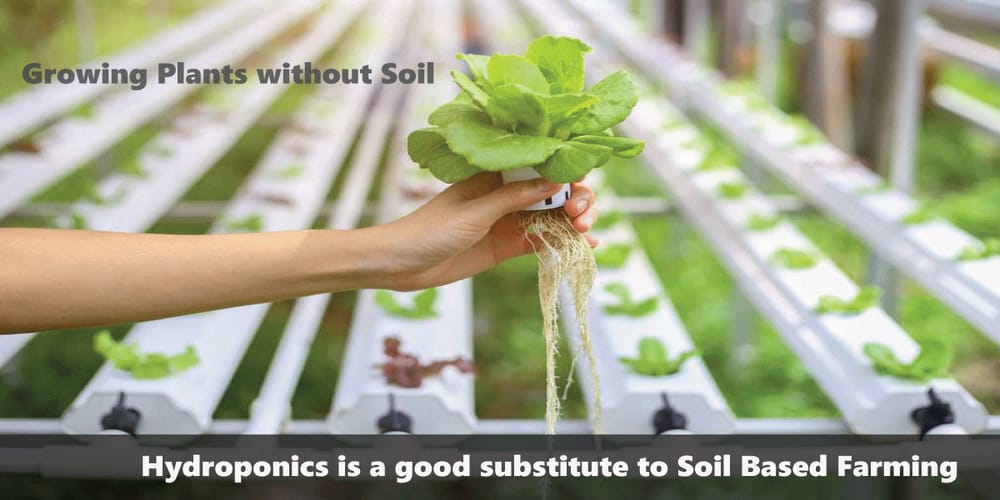What is Hydroponics?
Hydroponics is a type of cultivation method that does not use soil and essential nutrients are supplied to the plants using water as solvent. The growing medium can be Perlite, sand, Rockwool, etc. Hydroponic systems allow minute control over environmental conditions like temperature and pH balance and maximized exposure to nutrients and water. It operates under a very simple principle to provide plants exactly what they need when they need it. The nutrient solutions are tailored according to the type of plant avoiding unnecessary input cost.
A typical hydroponics set up consists of a covered germination chamber with a biodegradable sponge to sprout plants, a nursery where small planters are filled with clay pebbles for support and structure, and the grow systems where the plants become fully grown. A nutrient tank attached with pump and PVC pipes are provided to supply water to the plants. Once these plants have roots grown, they’re transferred to a system with higher nutrient contents and fully grown and harvested there.
Hydroponics can be practiced in areas with limited availability of arable land or the areas with contaminated soil profile. The amount of water required is just 10% of the amount used in soil based farming making it an ideal choice for the areas with water scarcity. Hydroponic growers have total control on growth factors like climate, temperature, humidity, light, the composition of the air. This makes it possible to grow food all year irrespective of the seasons. Eventually, the revenues keep flowing all year long.
The Indian Hydroponics Market is expected to grow at a CAGR of 13.53% during the period 2020-2027. Key growth driver being the demand for sustainable and protected farming practices. Hydroponics has proven results of higher efficiency. As per a report by a hydroponics technology company, the average yield of lettuce per acre yearly was recorded between 9-10 tons in soil-based agriculture and 300-400 tons in hydroponics agriculture. With several other benefits discussed earlier, hydroponics as a method of agriculture is bound to gain more traction in coming years.
FocusAgritech’s Outlook: hydroponics has a potential to be the significant mode of organic farming in the coming years. The companies can not only practice this mode of farming for high margin food supplies but can also develop training and consulting competencies. Some players have entered the market with their ready to use hydroponics kits for home gardens and even commercial uses. India’s fruit and vegetables (F&V) market was estimated at over Rs 5,00,000 crore in 2015. Even if we assume a meagre 0.5% of this overall market, it translates into a humongous opportunity of around Rs 2,500 crore for hydroponic produce. Established business groups like DS Group and Patanjali are also considering hydroponics on a commercial scale which is indicative of the promise held by this mode of farming.
Companies to Watch: Acqua Farms, Letcetra Agritech, BitMantis Innovations, UrbanKissan, Ela Sustainable Solutions, Junga FreshnGreen, Pindfresh
Recent Article
Blog: Smart Farming is the future of Agriculture







